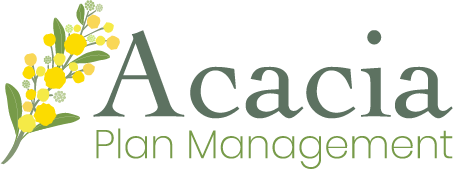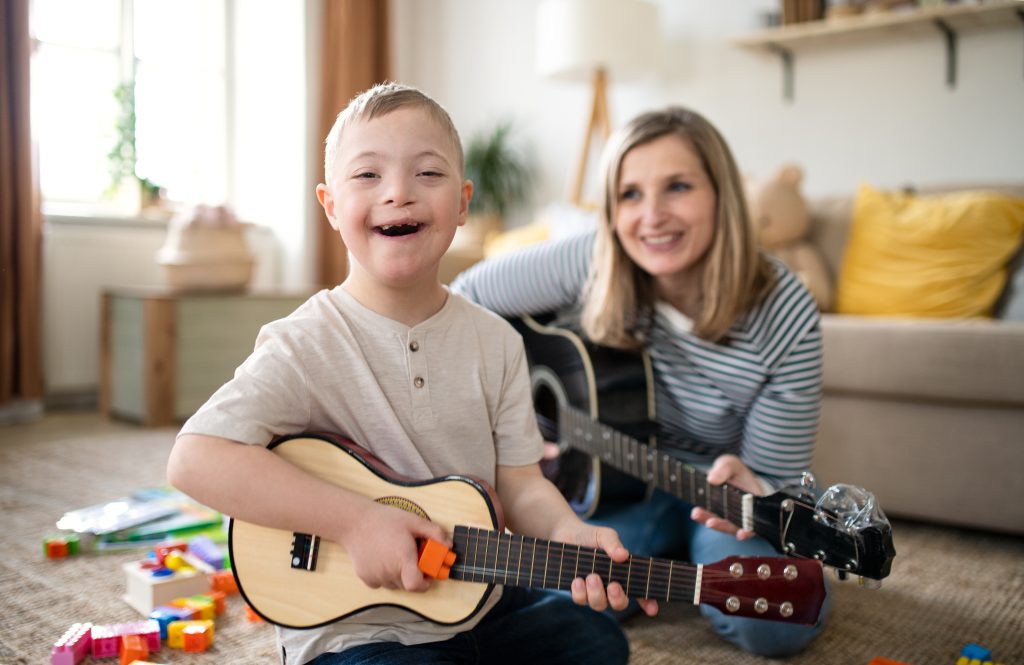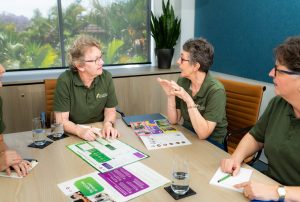Music therapy is fully recognised by the NDIS as a professional Allied Health therapy, under the Therapeutic Supports and Early Intervention Supports registration groups. It can be utilised to access funds by participants, provided it meets these four 4 criteria:
- It can assist with your NDIS goals
- It is conducted by a Registered Music Therapist (Registered with the Australian Music Therapy Association)
- It is considered reasonable and necessary
- You have NDIS funding allocated in Capacity Building – Improved Daily Living Skills
What is music therapy?
Music therapy is a research-based practice. Music can be used to actively support people to improve their health and well-being. Music therapists are university-trained musicians who study the effect of music on behaviours and how people feel and think.
Music affects our bodies, minds and feelings. It breaks down barriers of disability and builds bridges of communication, helping us to relate to each other better. It has the power to change moods, refocus attention, elicit emotions, express feelings, improve speech, improve gross and fine motor skills as well as promote social interaction and improve quality of life.
Music therapy and the NDIS
Music therapy has been recognised by the NDIS for inclusion in plans under the support category named Therapeutic Supports. It can be administered by a registered music therapist, who must have a post-graduate degree, and their supervised therapy assistants.
Additionally, the NDIS requires that music therapy must be conducted by a registered music therapist with the Australian Music Therapy Association.
Therapeutic supports are defined as supports that assist the participant to gain skills and improve independence related to identified needs in areas such as:
- language and communication;
- personal care;
- mobility and movement;
- interpersonal interactions; and,
- community living to support positive changes in the person’s functioning, development and well-being.
Which part of my NDIS plan do the funds for music therapy come from?
Funding for music therapy comes from the Capacity Building – Improved Daily Living section of your NDIS plan. For participants aged 7 years and over, the line item used is 15_615_0128_1_3 Assessment, Recommendation, Therapy or Training – Music Therapist. For participants under 7 years of age, the line item used is 15_005_0118_1_3 Capacity Building for Early Childhood Interventions – Other Professional.
How can music therapy help you achieve your NDIS goals?
If you’re trying to determine if music therapy is appropriate in your situation, consider these questions:
- Is music an important part of your life?
- Would you like to share your music time with other people?
- Would you like to explore ways to express yourself more?
- Could playing music with other people help you feel better?
Information for NDIS Planning
If you wish to include music therapy in your plan, you will need to prove how music can help achieve at least one of your goals. For instance, a regular group music therapy session might achieve your goal of increasing social interaction by making friends, meeting new people, socialising and communicating.
Music therapists also support individual young people who have emotional issues and would benefit from the opportunity to express and share their feelings in a safe and caring situation.
Typical goals that are funded by the NDIS that music therapy could help in achieving:
- To give me opportunities to meet people and make friends
- To increase my social skills
- To help me express my feelings, control my emotions and feel happy
- To encourage me to speak using song
- To maintain or improve mobility, communication and/or cognitive processing
- To improve my social interaction with others and learn appropriate behaviour in groups.
- Build my self-esteem/confidence.
Can I use my NDIS funding to pay for music lessons?
Having music lessons or attending a community music group is different to music therapy. For this reason, music lessons are not funded under Therapeutic Supports by the NDIS.
However, you can use NDIS funding from the Capacity Building – Increased Social and Community Participation section of your NDIS plan to pay for music lessons. Funding for music lessons still needs to be considered a ‘reasonable and necessary’ support that assists you to achieve your NDIS plan goals.
More information
The Australian Music Therapy Association has published a comprehensive information booklet detailing how music therapy can assist specific target need areas for people with disability. It also includes evidence-based references for each target need area. The booklet also includes some information about music therapy and the NDIS: AMTA Music Therapy in Disability Information Booklet (PDF).





